|
|
|
Sort Order |
|
|
|
Items / Page
|
|
|
|
|
|
|
| Srl | Item |
| 1 |
ID:
085467
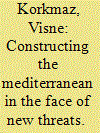

|
|
|
|
|
| Publication |
2008.
|
| Summary/Abstract |
Since the end of the Cold War, the discourses and practices of the EU towards the Mediterranean have emerged as an important area of study with regard to attempting to explain and analyse how Europe and the Mediterranean are reconstructed. This mutual reconstruction of two selves in the so-called Mediterranean relationship appears as a new type of praxis, a broadened self, following the model of European success in forming a regional security community. However, since the 9/11 terrorist attacks, the Mediterranean idea has been constructed by exploiting the new threats facing the West and Europeans. In this paper it is assumed that the discourse and practice of the EU in constructing the Mediterranean self can be seen as an extension of long-standing European policies of constructing Europe as an area of security. In the light of this evaluation, this paper focuses on the threat perceptions of the EU, the related power asymmetries in the Mediterranean relationship and the enduring asymmetry in the perception of the European and Mediterranean self in the face of 'new' insecurities.
|
|
|
|
|
|
|
|
|
|
|
|
|
|
|
|
| 2 |
ID:
085468
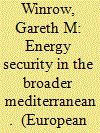

|
|
|
|
|
| Publication |
2008.
|
| Summary/Abstract |
This article examines the evolving relationship in the energy field between states north and south of the Mediterranean. The focus is on energy security, with North African energy producers eager to export their hydrocarbons to European consumers, and EU member states keen to diversify their energy suppliers, and, in particular, avoid over-dependence on Russia for natural gas imports. There are separate discussions on trade in crude oil, natural gas and liquefied natural gas. Concerns over terrorist attacks on energy infrastructure and the heightened interest of NATO on issues of energy security in the Mediterranean are also examined.
|
|
|
|
|
|
|
|
|
|
|
|
|
|
|
|
| 3 |
ID:
085463
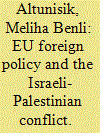

|
|
|
|
|
| Publication |
2008.
|
| Summary/Abstract |
This article aims to analyse the EU's evolving involvement in the management and resolution of the Israeli-Palestinian conflict. By using the framework of EU 'actorness', it argues that the EU has had the 'opportunity, presence and capabilities' to be an actor in the conflict. Developments in the international and EU contexts, as well as in the conflict itself, both allowed, and at times forced the EU to be more active. As a result the EU has become a more important actor in the conflict space. Yet this occurred at the expense of the EU's decreasing distinctiveness as an actor.
|
|
|
|
|
|
|
|
|
|
|
|
|
|
|
|
| 4 |
ID:
085460
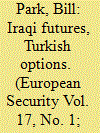

|
|
|
|
|
| Publication |
2008.
|
| Summary/Abstract |
This paper, completed as Ankara was considering extending its green light to cross-border military operations in northern Iraq, will explore a range of possible outcomes for Iraq, and Ankara's stakes in and policy preferences for Iraq and particularly northern Iraq. It will consider the aspirations of Iraq's Kurds, and the domestic, regional and international constraints on both Iraq's Kurds and Turkey. A range of alternative policy approaches available to Ankara will be discussed, and their implications assessed. The paper will argue that, whatever the outcome for Iraq overall, a high degree of Iraqi Kurdish independence will be an unavoidable feature of the region's political arrangements. Ankara's adjustment to this reality will be difficult.
|
|
|
|
|
|
|
|
|
|
|
|
|
|
|
|
| 5 |
ID:
085455
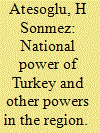

|
|
|
|
|
| Publication |
2008.
|
| Summary/Abstract |
This study examines the power of Turkey and other states in the region and provides a comparative assessment of their current national, military and economic power. For Turkey and the other top military powers, future developments in population, economic power, military power and national power were examined. Forecasts of population, economic, military and national power of these top military powers are presented.
|
|
|
|
|
|
|
|
|
|
|
|
|
|
|
|
| 6 |
ID:
085457
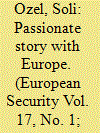

|
|
|
|
|
| Publication |
2008.
|
| Summary/Abstract |
Turkey-EU relations have a long and complicated history burdened with respective images about one another. On several dimensions though the completion of these relations through membership of Turkey in the EU is of immense importance. Already the Caucasus crisis has shown what a resurgent and resentful Russia may mean for European security. Efforts to keep Turkey at bay by proposing a Mediterranean union or suggestions of a 'privileged partnership' are unlikely to succeed. To better understand how membership will transform Turkey's politics and in what ways this will benefit the EU one must look at the interface between Turkey's domestic transformation of the past three decades and the changing international environment.
|
|
|
|
|
|
|
|
|
|
|
|
|
|
|
|
| 7 |
ID:
085452


|
|
|
|
|
| Publication |
2008.
|
| Summary/Abstract |
The EU has developed a normative approach to security over the past 15 years, which is strongly rooted in the concept of human security. This paper examines where human security is situated in the contemporary discourse on security and critically assesses both the concept itself and its application in European security policy. It argues that the approach has weaknesses in concept and practice which potentially undermine the normative aspirations of European security, particularly with regard to political agency, the universalisation of liberal values, legitimacy, sovereignty, the notion of security as a collective good and the external as well as internal dimensions of the EU as a security community.
|
|
|
|
|
|
|
|
|
|
|
|
|
|
|
|
| 8 |
ID:
085465
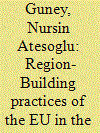

|
|
|
|
|
| Publication |
2008.
|
| Summary/Abstract |
In this paper, the focus will be on the EU's region-building practice in the Mediterranean via an evaluation of the successes and failures of the EMP, ENP and operations under the ESDP. With this aim in mind, some general approaches to region-building and how the Mediterranean is defined will be briefly examined. Drawing on the experiences of the Union on the ground, an assessment will be made as to what the next move of the Union in the Mediterranean will be in order for it to realise the aims stated in the Union's Security Document.
|
|
|
|
|
|
|
|
|
|
|
|
|
|
|
|
| 9 |
ID:
085459
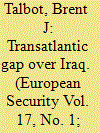

|
|
|
|
|
| Publication |
2008.
|
| Summary/Abstract |
This paper makes three major arguments: 1) US policy inconsistencies during the Iraq containment era alienated key European allies; 2) the allies really wanted the same outcome as the US in Iraq; and 3) the allies supported the US role as leader of the international system, but they envisioned a cooperative leader, not the unilateral actions of the Clinton and Bush (Jr) administrations. Thus, US policy inconsistencies are partially responsible for the lack of allied support for the 2003 invasion of Iraq. Three time periods are examined: the Gulf War (1990-91), the Clinton-led coalition that continued against Iraq under UN sanctions-prior to the invasion to oust Saddam Hussein (1991-2002), and events during the Bush administration which led to the 2003 takeover of Iraq. The paper concludes with lessons learned and implications for future of US-European relations.
|
|
|
|
|
|
|
|
|
|
|
|
|
|
|
|
|
|
|
|
|